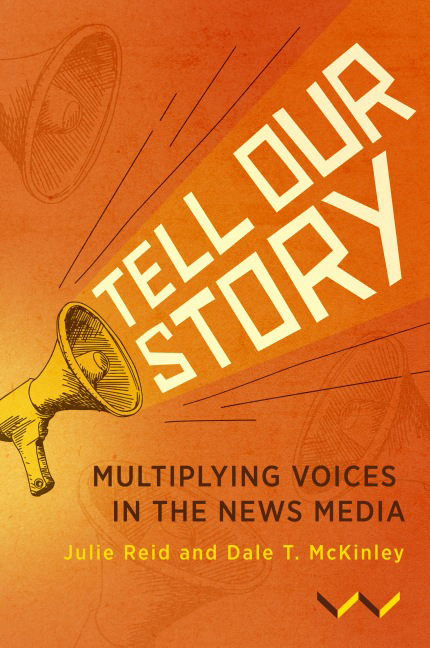Book contents
- Frontmatter
- Contents
- List of Figures
- Acknowledgements
- Abbreviations and Acronyms
- Chapter 1 The Importance of Voice and the Myth of the ‘Voiceless’
- PART 1 FROM THE INSIDE: VOICE(S) FROM THE GROUND
- Chapter 2 Community Perspective, Experience and Voice
- Chapter 3 Glebelands Hostel, Durban
- Chapter 4 Xolobeni, Eastern Cape
- Chapter 5 Thembelihle Community, Johannesburg
- PART 2 FROM THE OUTSIDE: DOMINANT VOICE
- Chapter 6 Dominant Media Telling and Elite Communication
- Chapter 7 The Political Economy of Dominant Power and Storytelling
- PART 3 NEW TRAJECTORIES FOR JOURNALISM AND VOICE(S)
- Chapter 8 Media Diversity and Voice(s)
- Chapter 9 Rethinking Media Freedom, Revamping Media Ethics
- Chapter 10 Planting the Seeds of Change
- Notes
- Bibliography
- Index
Chapter 7 - The Political Economy of Dominant Power and Storytelling
Published online by Cambridge University Press: 10 September 2020
- Frontmatter
- Contents
- List of Figures
- Acknowledgements
- Abbreviations and Acronyms
- Chapter 1 The Importance of Voice and the Myth of the ‘Voiceless’
- PART 1 FROM THE INSIDE: VOICE(S) FROM THE GROUND
- Chapter 2 Community Perspective, Experience and Voice
- Chapter 3 Glebelands Hostel, Durban
- Chapter 4 Xolobeni, Eastern Cape
- Chapter 5 Thembelihle Community, Johannesburg
- PART 2 FROM THE OUTSIDE: DOMINANT VOICE
- Chapter 6 Dominant Media Telling and Elite Communication
- Chapter 7 The Political Economy of Dominant Power and Storytelling
- PART 3 NEW TRAJECTORIES FOR JOURNALISM AND VOICE(S)
- Chapter 8 Media Diversity and Voice(s)
- Chapter 9 Rethinking Media Freedom, Revamping Media Ethics
- Chapter 10 Planting the Seeds of Change
- Notes
- Bibliography
- Index
Summary
The ideas of the ruling class are in every epoch the ruling ideas, i.e. the class which is the ruling material force of society is at the same time its ruling intellectual force. The class which has the means of material production at its disposal has control at the same time over the means of mental production, so that thereby, generally speaking, the ideas of those who lack the means of mental production are subject to it.
— Marx and Engels, The German IdeologySOCIETAL DOMINANCE: THEORY AND PRACTICE
To summarise the quote above from Marx and Engels for the purposes of the framing analysis here, the ideas of the ruling class (which consists of many different elements) are the dominant ideas in society. However, unlike an orthodox reading of Marx, such societal dominance is not always and everywhere maintained solely through the use of force but, as Antonio Gramsci (1971) posits, through the construction of a societal (or cultural) hegemony, in which consent of the masses is necessary.
Within what Gramsci broadly calls ‘civil society’, the ruling class is able to construct and maintain such hegemony (dominance), for example, through areas such as education and the media. Over time, the ideas about and practical ways (societal norms) in which the ruling class and the elites see and interpret the world become those of the masses themselves;that is, they are inculcated, consented to and broadly legitimised. A dominant (ruling) class in society translates into dominant ideas, dominant institutions, dominant social forces, dominant sectors of the economy and dominant political parties.
To fully locate and understand this kind of multisided societal dominance in democratic South Africa, let's take a brief look at the practical frame within which it has developed. Almost coterminous with the African National Congress's (ANC’s) rise to state power in 1994 was the adoption of a capitalist neo-liberal macroeconomic policy framework, which profoundly reshaped not only the political economy of South Africa but the more specific material realities and accompanying struggles of poor communities (Marais 1998).
For those communities, such as Glebelands and Thembelihle, the impacts were devastating. Massive job losses as well as widespread casualisation of labour were experienced by those fortunate enough to be employed; the ‘experience’ being accompanied by multifaceted social and economic damage to already vulnerable families and communities.
- Type
- Chapter
- Information
- Tell Our StoryMultiplying Voices in the News Media, pp. 133 - 144Publisher: Wits University PressPrint publication year: 2020



